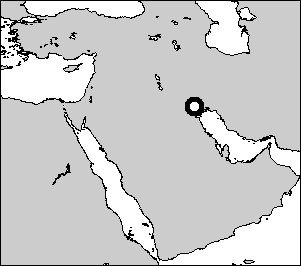
| www.CuriousTaxonomy.net |
|
The Flood in World Myth and Folklore
Middle East |
| © 2021 Mark Isaak |

This version of the Babylonian deluge comes from Berosus, a priest of Bel (Marduk) of Chaldean origin, who wrote around 281 BCE.
The god Chronos in a vision warned Xisuthrus, the tenth king of Babylon, of a flood coming on the fifteenth day of the month of Daesius. The god ordered him to write a history and bury it in Sippara, and told him to build and provision a vessel (5 stadia by 2 stadia) for himself, his friends and relations, and all kinds of animals. Xisuthrus asked where he should sail, and Chronos answered, "to the gods, but first pray for all good things to men." Xisuthrus built a ship five furlongs by two furlongs and loaded it as ordered. After the flood had come and abated somewhat, he sent out some birds, which returned. Later, he tried again, and the birds returned with mud on their feet. On the third trial, the birds didn't return. He saw that land had appeared above the waters, so he parted some seams of his ship, saw the shore, and drove his ship aground in the Corcyraean mountains in Armenia. He disembarked with his wife, daughter, and pilot, and offered sacrifices to the gods. Those four were translated to live with the gods. The others at first were grieved when they could not find the four, but they heard Xisuthrus' voice in the air telling them to be pious and to seek his writings at Sippara. Part of the ship remains to this day, and some people make charms from its bitumen.
Frazer, 1919, 108-110; George Smith, "The Chaldean account of the Deluge," in: Dundes, 1988 [1873], 42-44.

The following account is also attributed to Berosus. No further reference for its source is given, and since other authorities giving flood accounts from Berosus do not include it, I doubt its authenticity.
The antediluvians were giants who became impious and depraved, except one among them that reverenced the gods and was wise and prudent. His name was Noa, and he dwelt in Syria with his three sons Sem, Japet, Chem, and their wives Tidea, Pandora, Noela, and Noegla. From the stars, he foresaw destruction, and he began building an ark. Seventy-eight years after he began building, the oceans, inland seas, and rivers burst forth from beneath, attended by many days of violent rain. The waters overflowed all the mountains, and the human race was drowned, except Noa and his family who survived on his ship. The ship came to rest at last on the top of the Gendyae or Mountain. Parts of it still remain, which men take bitumen from to make charms against evil.
Hugh Miller, The Testimony of the Rocks: or, Geology and its Bearings on the Two Theologies, Natural and Revealed. (Boston: Gould and Lincoln, 1857), 291-292.
